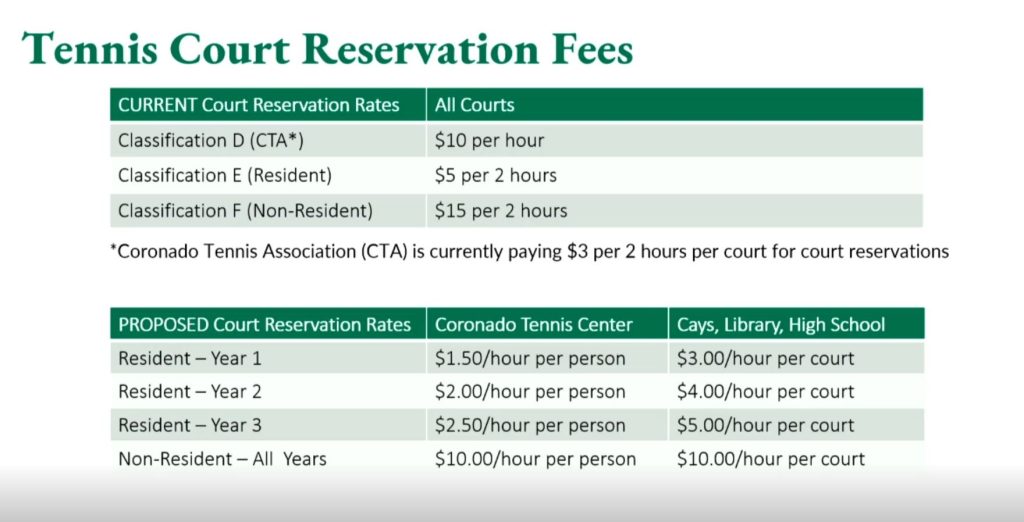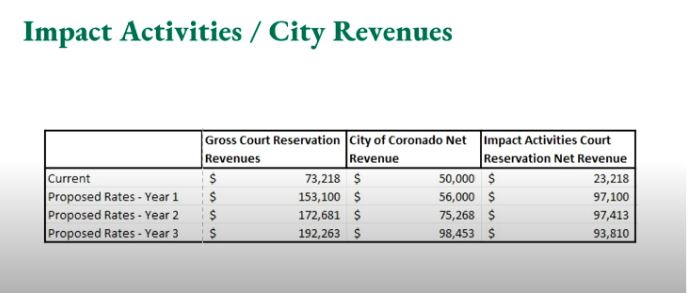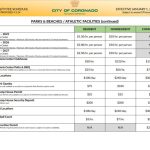
After passionate discourse from the public on the matter, the Coronado City Council approved updated recreation fees and facilities use policies at its Sept. 17 meeting.
Fees will increase on Jan. 1.
By increasing rates, the city will recapture more of the costs associated with recreation and account for rising expenses.
Coronado currently subsidizes 65% of its recreation programs, which include everything from summer camps to tennis court rentals. The rest is covered by user fees. Now, the city will aim to recover 40% of the costs of its recreation programs, a 5% increase.
The update includes variable pricing for residents and non-residents, a practice common among other cities. The rationale is that all Coronado residents, whether they use a recreational facility or not, pay into those services via taxes. Nonresidents, therefore, are charged more.
In another major change, the city will test operating the Coronado Skatepark with longer opening hours, no entry fee, and intermittent supervision. The pilot will run from January to June of 2025.
Currently, fewer than four people use the skatepark daily, on average. It operates for 28 hours per week, under full staff supervision. The entry fee recovers 15% of the costs of its operation.
Now, the park will be open from 8 a.m. to dusk, with no entry fee, and supervision only at opening, closing, and for cleaning and checks. The city hopes to increase utilization by making this change, as well as to save money by cutting down on staff costs.
Though the changes are comprehensive, much of the public discourse on the matter centered on the increased prices to reserve the city’s tennis courts.
It has been years since tennis court reservation fees were increased, and some in the tennis community say the approved increases are too steep. Others say the change is long overdue.
The amount of the increase varies vastly on circumstance. For residents, the increases will be staggered over the next three years; for nonresidents, they will be immediate. Courts at the Coronado Tennis Center will be charged per-person, but others, such as those at the Coronado Public Library, will be charged per court.
But, for residents, when the final price increase takes effect in 2027, the cost to reserve a court at the tennis center will be $5 per person for two hours. Today, it is $5 total to reserve the court. Assuming a game of doubles, then, each player today would be paying $1.25 each for their reservation. That’s a 300% increase, albeit over three years.

Although it is a larger increase than some other recreational facilities face, fees have not been increased in years. In 2021, Coronado contracted Impact Activities to manage its tennis facilities.
“Impact Activities started management (of Coronado’s facilities) under the agreement and the understanding that we would be charging a per-person court fee,” said Joel Myers, the city’s tennis director, during public comment. “We were told this had been approved by the City Council back in 2016, and the city had knowledge that they were charging per-court instead of per-player by mistake. Based on expected revenue from per-person bookings, we invested heavily to improve the community experience.”
Myers said those improvements include an online reservation system and application, extended staffing and hours at the pro shop, free clinics, and community events. In three years, Impact has not been able to charge the rates it expected for tennis court reservations.
At an earlier City Council meeting, in which the rate increases were proposed, members of the tennis community spoke against the increases, with some saying the change would make it impossible for them to continue to play.
Because Impact Activities is a private company and does not need to disclose its finances, some residents questioned what the increase would cover. At Tuesday’s meeting, city staff returned with more robust data about projected revenue, and how much would be diverted to the city as a part of a revenue sharing agreement.

Cities often contract their services, City Council Member Carrie Downey said, and don’t have to open their books or show profit and loss statements.
“When we go to contract, we say, ‘Will you do this?’ and then say, ‘How much will this cost?’ and then we take it or leave it,” Downey said. “We were lucky we got somebody so qualified and willing to work with us – and willing to stay three years when they weren’t getting the amount they promised.”
The council agreed that charging more to nonresidents, since they do not pay the city taxes that subsidize most of the tennis facilities, was fair. However, both Mayor Richard Bailey and City Council Member Casey Tanaka worried that the jump to $10 per hour, per person was steep. Bailey asked that the city track its court utilization and adjust if a large decrease occurs, while Tanaka suggested $5 per hour instead.
Council Member John Duncan pointed out, however, that walk-on games are free.
“We have a problem right now,” Duncan said, referencing the fact that a resident can currently reserve a court and invite nonresidents to join. “The truth is, we don’t have nonresidents paying a nonresident fee. Not always, but there is a huge gap.”
Tanaka said that, while he agreed that rates needed to increase, and while he agreed that nonresidents should pay more, he thought the increase for nonresidents was too high. He said it was difficult to discern the rationale for that number.
“I share the public’s frustration, because if I were a tennis player and my rates were going to go up, I wouldn’t be satisfied with (the city’s) answer,” Tanaka said.
City Council Member Mike Donovan also supported a per-person fee.
“The feedback that we got loud and clear is that there should be a differential between the residents’ fee and the nonresidents’ fee,” Donovan said. “If you charge on a per-court basis, that becomes impossible to track.”
Despite pushback from some of the tennis community against the changed fees, others were in support of them.
“It is not possible to have wonderful recreation facilities without fees for their use, in addition to the high property taxes Coronado residents pay,” said Mary Jane Clements, who said Impact is managing the city’s facilities well.
“It’s unfortunate that everything costs more today, but the city can’t ignore that fact,” she said. “We all have to adjust our lives to the current cost of living.”
Downey moved approval of the recommended changes, with the caveat that staff review utilization of recreation facilities after the changes go into effect. The motion passed unanimously.
The proposed fee updates and facilities use updates follow.
Facility Use Policy Recommended Updates
- Streamlining the facility user classifications from the current seven to three: resident, nonresident, and commercial.
- Eliminating the current $25 application fee
- Allowing verified resident nonprofit organizations to rent certain rooms for free for public meetings, subject to availability.
- Removing age-based limitations on rental options.
- Creating an outdoor instruction permit, which would allow commercial instruction (for example, beach yoga) for up to 10 participants at specified park and beach locations.
- Making the city’s volleyball courts and athletic fields rentable facilities.
- Updating the language around recurring use policies.
Proposed Fee Schedule
Below are the proposed changes to the recreation department’s fee schedule. The fees will be adjusted annually based on the Consumer Price Index (tennis and pickleball court reservation fees will be exempted from the increase for the first three years), with fees reviewed in full every five years. The current policies are here.













